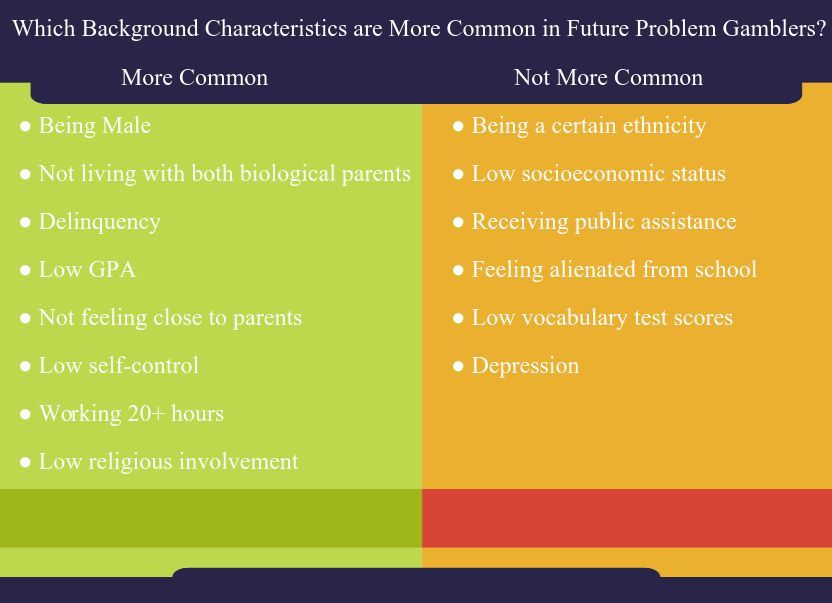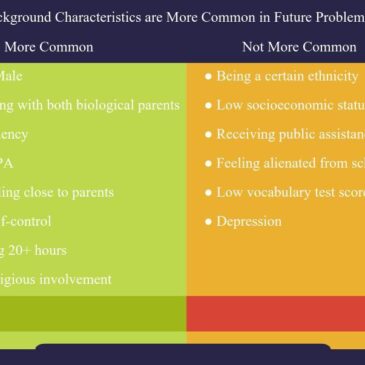There are many popular depictions of people who resort to crime to make up for gambling debts, such as movies like Uncut Gems and Lock, Stock, and Two Smoking Barrels. But do high levels of gambling actually cause involvement in crime? The WAGER reviews a paper by Christopher Dennison and colleagues which finds that the negative consequences of gambling do not lead otherwise law-abiding people to commit crimes. Rather, the types of people who are interested in gambling tend to have an above-average willingness to commit crimes even before their debt becomes unmanageable.
What was the research question?
Does problem gambling predict later involvement in crime even after taking into account background characteristics that predict both gambling and crime?
What did the researchers do?
The authors drew upon a nationally representative dataset of U.S. adolescents who were assessed on background characteristics such as socioeconomic status, academic performance, age, gender, religious involvement, and personality traits in 1994-1995. In 2002-2003, the same respondents reported on their lifetime gambling involvement, and in 2008-2009 reported on their criminal history in the past twelve months. The authors first looked to see if problem gambling status in 2002-2003 predicted criminal behavior in 2008-2009 without regard to background characteristics.
Then, the authors applied a statistical technique to the data called “inverse probability weighting.” This technique gives non-problem gamblers who had background characteristics similar to those of problem gamblers more influence on the results than non-problem gamblers who had dissimilar backgrounds to the problem gamblers. This technique adjusts the results for the fact that problem gamblers are more likely to have backgrounds (see Figure) that promote crime among gamblers and non-gamblers alike. The adjustment makes it more likely that any differences in criminal involvement between problem gamblers and non-problem gamblers is due to different levels of gambling, rather than background characteristics.
What did they find?
The initial (unweighted) results indicated that problem gambling is indeed associated with later criminal activity. However, the weighted results revealed that non-problem gamblers who had backgrounds similar to problem gamblers were just as likely to later commit crimes. These findings imply that gambling is not the reason why problem gamblers more often have a criminal history than non-problem gamblers. Instead, factors that precede both gambling and crime—such as having low self-control, not feeling close to one’s parents, and being male—put adolescents at risk to one day develop gambling problems and commit crimes.

Figure. The left part of the table shows the background characteristics that were more common among adolescents who would later report problem gambling than adolescents who would not go on to report problem gambling (i.e., standardized group difference .20 or higher). Many of these characteristics predict both problem gambling and committing crime in adulthood. The right part of the table shows the background characteristics that did not distinguish these two groups of adolescents. Click image to enlarge.
Why do these findings matter?
Interventions that reduce gambling will not also reduce crime, but policymakers can reduce both problem gambling and crime by reducing risk factors (see Figure) that are apparent at least as early as adolescence.
Every study has limitations. What are the limitations of the study?
Background characteristics, problem gambling, and criminal involvement were all measured by self-report. It is possible that more objective measures would reveal a stronger association between gambling and crime, even after taking common causes of gambling and crime into account.
For more information:
Do you think you or someone you know has a gambling problem? Visit the National Council on Problem Gambling for screening tools and resources. For additional resources, including gambling and self-help tools, please feel free to visit The BASIS Addiction Resources page.
— William McAuliffe, PhD
What do you think? Please use the comment link below to provide feedback on this article.





JOEL T FRIEDLAND May 19, 2020
Gamblers do not become better mannered and do not improve their strength of character from their gambling. Criminals usually have poor manners and are usually weak willed. Most end up in jail, sooner of later.
Well mannered criminals with strong wills, whose crimes are not prosecuted, can go very far in life; Trump was elected President, despite his character flaws and many, many crimes, none prosecuted to sentencing — he pleaded no contest and paid fines sometimes.